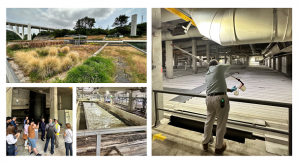
The Mediterranean region is warming 20% faster than the global average and for every 1-degree global temperature increase, it would warm up by at least 1.5-2 degrees. This is severely impacting water and sanitation and the health and well-being of the region’s population. According to the World Economic Forum, the Mediterranean region hosts 60% of the world’s water-poor population (with less than 1,000m³ per inhabitant, per year). In the South and East of the Mediterranean, over 180 million people suffer from water scarcity today and the entire region is increasingly exposed to extreme heat, water shortages, and an alternation between extreme droughts and flooding, leading to reduced water quality with rising water-related diseases and mental health consequences, as well as social inequalities.
Water demand is projected to double or even triple by 2050, according to the UN Environment Programme. By 2080, in the Mediterranean there will be 30% less rainfall in spring summer and an additional 10% or 20% heavy rainfall events outside of summer. Water temperature is expected to rise by between 1.8°C and 3.5°C by 2100.
Against this alarming backdrop, government representatives from Albania, Bulgaria, Croatia, Greece, Israel, Italy, Malta, Montenegro, Morocco, North Macedonia, Portugal, Slovenia, Tunisia and Türkiye, together with academic experts from Spain and international partners, gathered in Lisbon on 4-5 June 2024, initiating regional dialogue and exchange of experience on the issues of climate, water and health. The discussions took place in the framework a technical workshop under the Protocol on Water and Health, hosted by Portugal and organized by UNECE, with support of WHO Regional Office for Europe, as a partner event under the EU Green Week. The workshop aimed at taking stock of main challenges, priorities and needs of the Mediterranean countries and identifying joint approaches to increasing climate resilience of the water and sanitation sectors.
Discussions concluded that the main challenges and priorities are indeed common for the Mediterranean region but that more strategic and systematic climate action is needed across sectors with policies and concrete measures targeting not only the national but also regional and local levels. Participants agreed that there is a need to further define the concept of climate resilience when it comes to water and to sanitation sectors. The water-energy-food-ecosystems nexus was a strong feature in the experiences shared by countries, who discussed that future work under the Protocol needs to unpack this concept in relation to climate.
Countries also highlighted a wealth of effective policy examples and innovative technological solutions and triggered opportunities for further bilateral exchange and peer-to-peer learning and support. Participants therefore also agreed exploring the opportunity to establish a network of Mediterranean countries under the Protocol on Water and Health, with climate resilience being a common denominator and trigger for future cooperation.
The event also featured a visit to the Alcantara Water Factory, a cutting-edge wastewater treatment plant which collects and treats, including for reuse, wastewater from 800,000 households in Lisbon and its surroundings. The facility, which is mostly underground, has one of Europe’s largest green rooves (watered by treated wastewater), blending in with its surrounding environment.